Welcome to Yell
Yell, the gateway to the Northern Isles, is the second largest island in Shetland. Its long and varied coastline and stretches of uninhabited moorland have much to offer wildlife enthusiasts, hill walkers and those who simply want a measure of peace and quiet. Yell also serves as a good base to explore Fetlar and Unst.
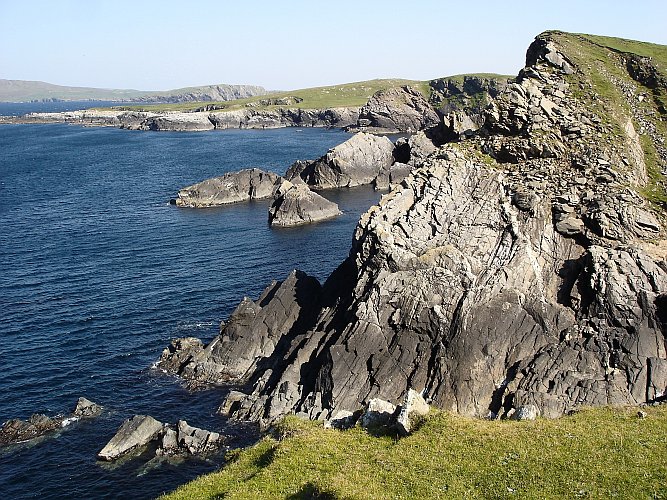 Yell Cliffs
Yell Cliffs
 From Toft, on the north mainland, it takes only fifteen minutes by car ferry to reach Ulsta at the southwest corner of Yell. About 1,000 people live on the island and you will find a lifestyle which uniquely blends tradition with a full range of up-to-date facilities.
From Toft, on the north mainland, it takes only fifteen minutes by car ferry to reach Ulsta at the southwest corner of Yell. About 1,000 people live on the island and you will find a lifestyle which uniquely blends tradition with a full range of up-to-date facilities.
Access
You are free to walk almost anywhere but please close gates and keep dogs under strict control.
Birds
In summer, Yell’s moorlands are alive with breeding birds. Whimbrel, Red-throated Divers, Dunlin and Golden Plover can all be seen from the roadside. The sharp eyed observer may catch a glimpse of Britain’s smallest bird of prey the Merlin, as it dashes after small birds. Bonxie (Great Skua), Skootie Alan (Arctic Skua), and Dunter (Eider Duck), also nest on the moorland. The Tirrick (Arctic Tern), harbinger of summer, can also be seen but please try to avoid walking near their breeding colonies as they will defend new eggs and young most vigorously.
Six species of gull nest on the island, the commonest being the Herring Gull. Along the coast, Fulmars and Black Guillemots are common with Puffins, Shags, Guillemots and Kittiwakes nesting on the sea cliffs.
Flora
Blanket peat covers much of the island, providing a globally rare but important wildlife habitat. This peat is formed from the compression of dead (but not decomposed) plant remains and forms at the rate of about 1mm a year. In places this peat is over 3 metres in depth (3,000 years). Look carefully for 2 special plants, Butterwort and Sundew which can be found on the moorland. Both these plants supplement their diet with insects, by trapping them on their leaves.
Sea Watching
Yell is one of the best places in Europe to see Dratsies (Otters) which is why Hugh Miles chose to film his award winning documentary film, “On the Track of the Wild Otter” here. Yell is popular with Otters because of the rich food supplies in the offshore shallows, a low peaty coastline for excavating holts and abundant freshwater for bathing, so as to clean off salt water. Shetland’s Otters tend to spend a lot of time in the sea so this is an important consideration.
The map inside indicates some of the best places to see Otters but remember they are shy creatures and have a keen sense of smell so keep down-wind of them!
Grey and Common Seals can often be spotted basking on rocks at low tide. With luck, the sea-watcher might also spot whales and dolphins, such as the Pilot Whale, Killer Whale or Harbour Porpoise. Remember to keep an eye out for these and seabirds as you cross on the ferry.
The West Road
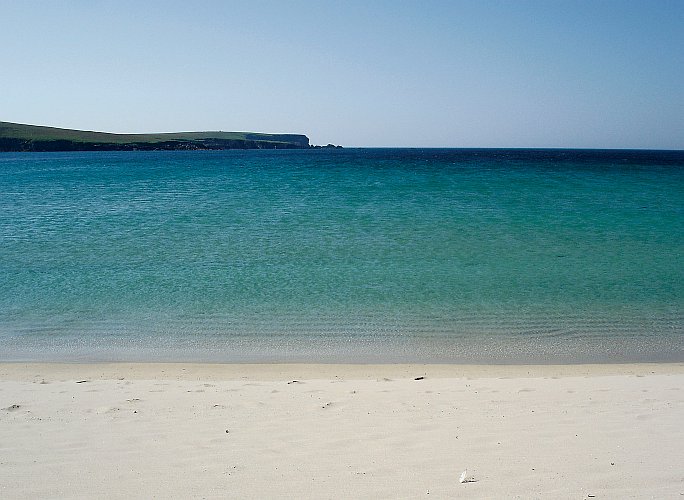 West Sandwick Beach
West Sandwick Beach
 From Ulsta the main road follows the coastline, with fine views across Yell Sound with the Ramna Stacks silhouetted in the far north
From Ulsta the main road follows the coastline, with fine views across Yell Sound with the Ramna Stacks silhouetted in the far north
The Ness of Sound, just over the hill from Ulsta, is easily recognised with its distinctive double tombolo. In summer the roadside here is bright with wild flowers and many birds nest in the fields. The village of West Sandwick has one of Yell’s best sandy beaches, a fine place for a quiet summer picnic. A coastal walk takes you in sight of the Iron Age fort at Da Birrier.
The Middle
Yell is shaped like a rough rectangle, almost cut in half by two voes, Whalefirth and Mid Yell. Take the branch road which runs along the west side of Whalefirth to Da Herra.
As you travel along this road, look across to Volister, one of the many small communities left to decay and ruin in the last century, when the laird evicted inhabitants from their crofts to make room for sheep. There is spectacular coastal walking north to the Eigg, Ern Stack and Stuis.
Leaving Da Herra, and heading east past the head of Whalefirth, the ruin of Windhouse stands high on the hill to the left. The lodge has been developed into a camping böd. This site has been occupied for over 5,000 years although the oldest visible remains are of the 2,000 year old broch. Windhouse is reputed to be Shetland’s most haunted house!
The communities of Mid Yell and North-a-Voe cluster around Mid Yell Voe which is sheltered by the island of Hascosay. Mid Yell is the main village on the island and has many community facilities including a Junior High School, shop, post office, health centre, play parks, marina and a leisure centre.
The North
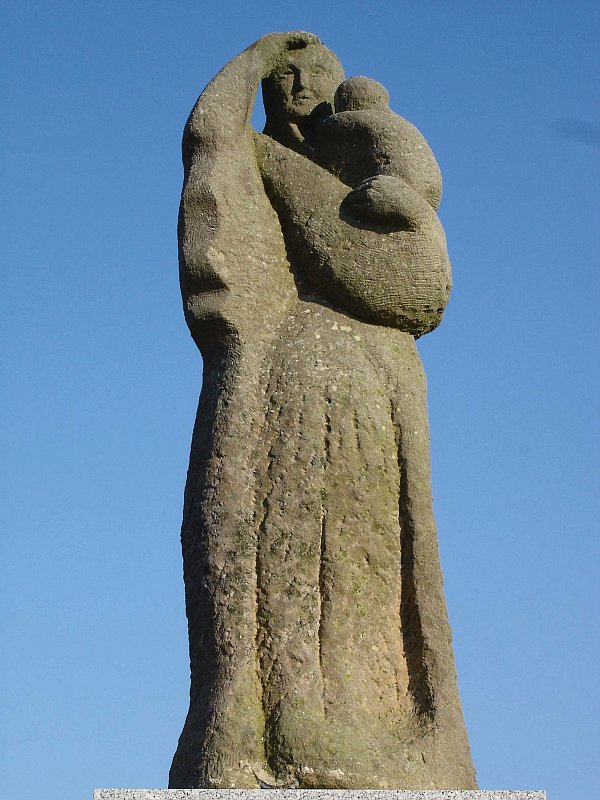 Gloup Memorial
Gloup Memorial
 In the far north of the island, the Gloup Memorial commemorates the fifty eight fishermen who were drowned when disaster struck the Haaf fishing on the night of July 21st 1881.
In the far north of the island, the Gloup Memorial commemorates the fifty eight fishermen who were drowned when disaster struck the Haaf fishing on the night of July 21st 1881.
From the memorial you can walk south along the lonely steep sided voe which was once busy with men working at the Haaf station whose remains can still be seen.
Head west to Burgi Stack, where you will find the remains of an Iron Age fort. Further north, you may see the isolated house of Vigon, uninhabited since the 1880s, and the Holm of Gloup, an excellent spot for watching seabirds and seals.
It is best to set aside a whole day to explore the north-west corner of Yell, as there is much to see.
A most enjoyable day can be spent at the Sands of Breckon. Sheltered, except from the north, this lovely beach with its extensive area of blown shell sand has interesting traces of Viking and earlier occupation.
Among the abundant wild flowers, look out for the rare Autumn Gentian. As you travel south from Cullivoe, you will come to Gutcher, the terminal for the ferries to Unst and Fetlar. The Wind Dog Cafe is a cafe-restaurant that also hosts workshops and sells music, books and postcards.
Take the road to North Sandwick, from here you can walk down to one of Shetland’s best preserved brochs at Burraness. Alternatively you can take the turning a little further south towards Cunnister and Kirkabister, travelling along Basta Voe, and approach Burraness from that direction. This is prime Otter territory, so keep a sharp watch for them.
Excavations have also been made of an Iron-Age settlement at the Tafts of Bayanne at Sellafirth. Information about the site is available at Bayanne House where there are also facilities for family history research and an internet cafe.
From Colvister follow the north side of the fence west to Lumbister, an RSPB sanctuary. Birds breeding in this moorland include Snipe, Lapwing, Skuas and Ringed Plover.
The East Road
Travelling along the road from Mid Yell towards Aywick and Burravoe, be sure to leave plenty of time to explore the side roads, and admire the magnificent views toward, Unst, Fetlar, Whalsay and Skerries. Even Bressay and Noss are visible on a clear day.
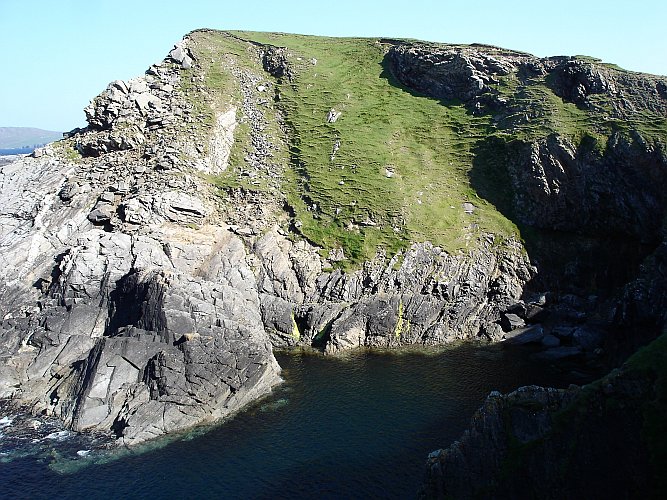 Cliffs at Yell
Cliffs at Yell
 At Aywick, there is a shop, post office, play park and charity shop.
At Aywick, there is a shop, post office, play park and charity shop.
On the shore at Otterswick, you can see the figurehead known as the White Wife (or Widden Wife) which came from the Bohus, a German training ship which was wrecked on the Ness of Queyon in 1924.
The last side road before reaching Burravoe takes you to Gossabrough and another beautiful sandy beach. Burravoe has a marina and a walk north from here takes you to Ladies Hol and on to the Horse of Burravoe - a good coastal walk where you should look out for seabirds and seals.
Be sure to visit the local Museum and Exhibition Centre at Burravoe which is housed in the Old Haa.
Between Burravoe and Ulsta you can take a long walk up through the beautiful valley of Erisdale, past the former home of storyteller Brucie Henderson, to the Catalina Memorial commemorating the crew lost in an aircrash during the Second World War.
The Old Haa
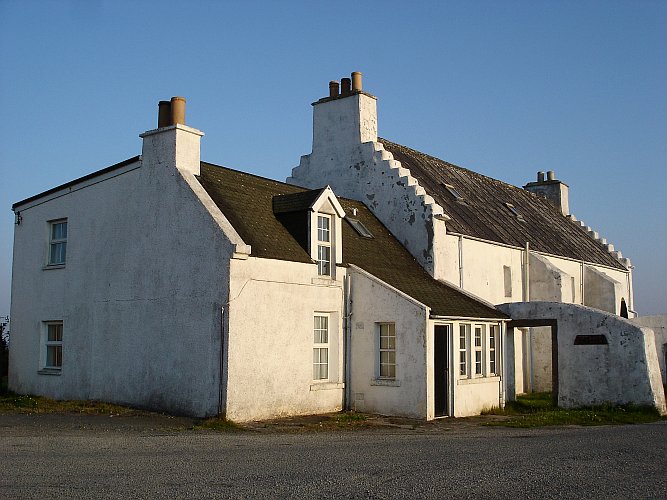 Old Haa Museum
Old Haa Museum
 The Old Haa at Burravoe dates from 1672 and was opened as a museum in 1984. It houses a permanent display of material depicting the history of Yell. Outside there is a monument to the airmen who lost their lives in 1942 in a Catalina crash on the moors of South Yell.
The Old Haa at Burravoe dates from 1672 and was opened as a museum in 1984. It houses a permanent display of material depicting the history of Yell. Outside there is a monument to the airmen who lost their lives in 1942 in a Catalina crash on the moors of South Yell.
The Old Haa is also home to the Bobby Tulloch Collection and has rooms dedicated to photographic archives and family history.
The museum includes a tearoom, gallery and craft shop, walled garden and picnic area, and is also a Neighbourhood Information Point.
Bobby Tulloch
Bobby Tulloch was one of Yell’s best-known and loved sons. He was a highly accomplished naturalist, photographer, writer, storyteller, boatman, musician and artist. Bobby was the RSPB’s Shetland representative for many years and in 1994 was awarded an MBE for his efforts on behalf of wildlife and its conservation. He sadly died in 1996 aged 67.
Some Useful Information
| Ferry Booking Office: | Ulsta, Tel: 01957 722259 |
| Neighbourhood Information Point: | Old Haa, Burravoe, Tel 01957 722339 |
| Shops: | Cullivoe, Mid Yell, Aywick, Burravoe and Ulsta |
| Fuel: | Cullivoe, Mid Yell, Aywick, Ulsta and West Sandwick |
| Public Toilets: | Ulsta and Gutcher (Ferry terminals), Mid Yell and Cullivoe (Piers) |
| Places to Eat: | Gutcher and Mid Yell |
| Post Offices: | Cullivoe, Gutcher, Camb, Mid Yell, Aywick, Burravoe, and Ulsta |
| Public Telephones: | Cullivoe, Gutcher, Sellafirth, Basta, Camb, Burravoe, Hamnavoe, Ulsta and West Sandwick |
| Leisure Centre: | Mid Yell, Tel: 01957 702222 |
| Churches: | Cullivoe, Sellafirth, Mid Yell, Otterswick, Burravoe and Hamnavoe |
| Doctor and Health Centre: | Mid Yell Tel: 01957 702127 |
| Police Station: | Mid Yell Tel: 01957 702012 |


